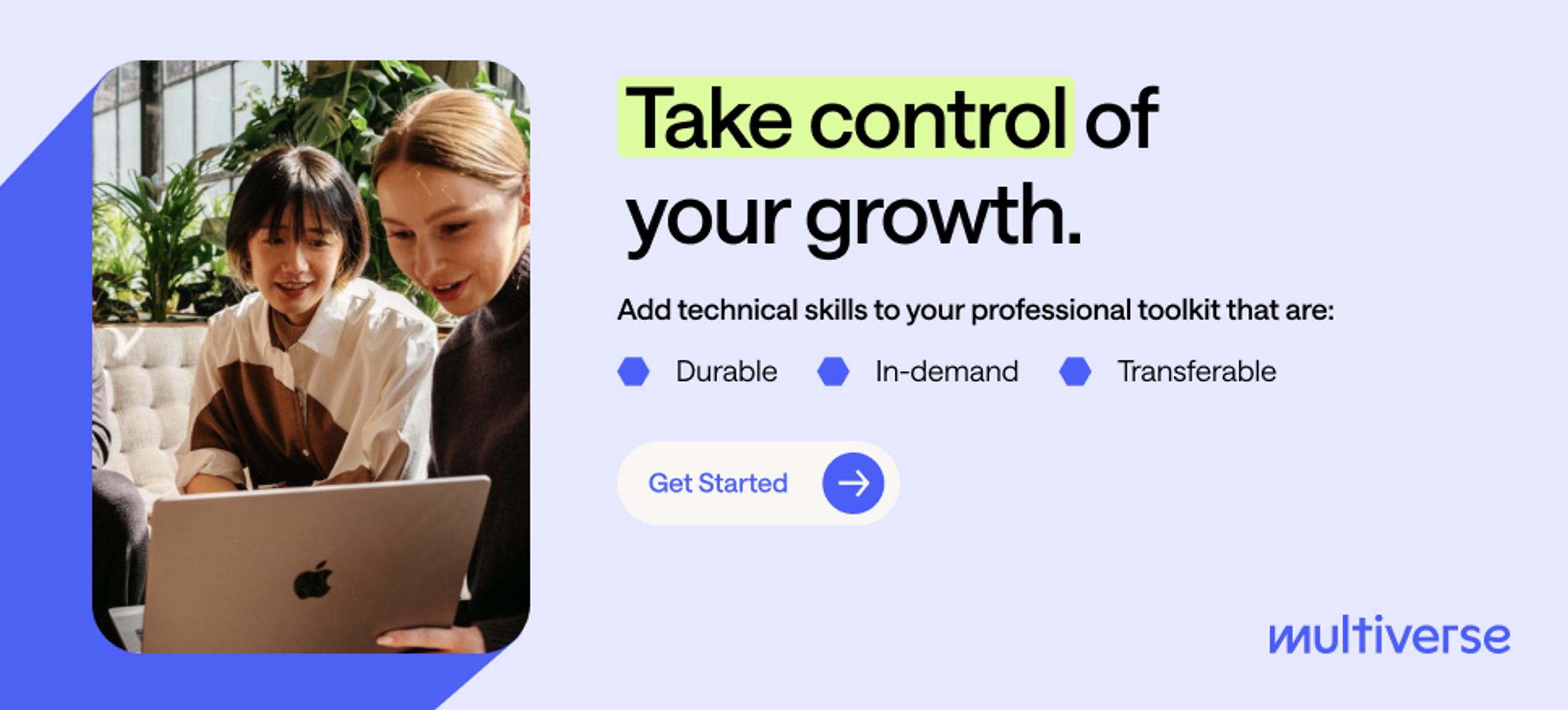Python is one of the most popular coding languages in use today.
According to the 2024 Stack Overflow Developer Survey(opens new window), 65% of professional developers worldwide used Python for development work in the previous year — making it the third most popular programming language overall, behind JavaScript and SQL.
Professionals at companies of all sizes use Python to manage data and create machine learning algorithms, among other data-oriented efforts. Learning Python can open the door to an in-demand, lucrative career as a Software Engineer or Data Analyst — or even help you streamline and broaden the depth of the work you do in your current career.
Do you want to learn Python? Then this article is for you. Below, we’ll be answering some of the top questions for beginning programmers at any stage of their professional careers, including:
- Is Python hard to learn?
- How long does it take to learn Python?
- Is Python worth learning?
- What can you build with Python?
Let’s dive in.
Is it worth learning Python in 2024?
Dutch programmer Guido van Rossum created Python in 1991. It’s still one of the most widely used programming languages today.
Many developers and tech companies prefer Python because its syntax is easy for humans to read. And they can use it to build scalable applications.
Here are four top reasons for learning Python in 2024.
1. High-demand
Professionals at companies of all industries and sizes — including Netflix, Amazon, and Reddit — use Python. So, it’s in high demand.
Moreover, Python is the most popular programming language(opens new window) among people learning to code. Approximately 62% of developers across all skill levels use Python.
An August 2024 LinkedIn search for jobs specifying Python skills in the UK returned 90,835 results overall.

How many is that? For example, you can compare that figure to the number of results in a search for jobs asking for C# (the ninth most popular coding language in the Stack Overflow survey) skills, which returned less than 10,000.

The bottom line is that among technical competencies, Python is a highly sought after skill.
2. Flexibility
Python’s versatility makes it one of the best programming languages to learn for aspiring tech professionals.
Learning Python doesn’t mean you need to pursue a job as a Python Developer. As for job prospects, Python skills are easily transferable, so you could work in data science, software engineering, marketing, or even artificial intelligence.
3. Lucrative job options
Not only are there many careers that need Python skills, but they also pay well. Mastering Python could help you land a job with a high-paying salary or even advance in your current company to greater responsibilities.
Some Python-adjacent titles in the UK net high median salaries. For example:
- Python Developer: £73,000 (source: devITjobs)
- Machine Learning Engineer: £60,000 (devITjobs)
- Data Engineer: £70,000 (itjobswatch)
- Full Stack Developer: £60,000 (devITjobs)
- Back-End Developer: £67,500 (devITjobs)
4. AI applications
ChatGPT, MidJourney, and other AI applications are booming. The size of the artificial intelligence market is projected to reach a staggering £145 billion in 2024(opens new window), growing to a market size of close to £600 billion by 2030. To support that growth, companies will need to hire more Python Engineers.
Python powers many machine learning and artificial intelligence technologies. As adoption of AI tools grows among the general population, it stands to reason there will be opportunities at the intersection of Python and artificial intelligence for professionals in an array of fields.
Examples of Python in action
Companies typically use Python to develop back-end services. These services refer to server-side or behind-the-scenes functions, like retrieving information from databases and authenticating login information.
Businesses can also use Python to perform data analytics and learn more about customers.
Here are a few real-life examples of how companies are using Python:
- Netflix: The streaming service uses Python to create machine learning algorithms that personalise the user experience. Specifically, it creates personalised recommendations for shows or movies users should watch. Also, Netflix uses Python(opens new window) to manage its content delivery network, which stores content on servers around the world for streaming.
- Spotify: Spotify gathers and analyses data about users’ music preferences using Python code. Based on this information, it generates personalised recommendations for artists, songs, and people to follow.
- Amazon: The biggest online retailer in the world uses Python ML engine to analyse shopping and search habits to recommend relevant products and serve ads.
How long does it take to learn Python for beginners?
Python is one of the easiest languages to learn. It uses a simple and intuitive syntax — the way you arrange code — that resembles the English language. With regular practice every week, most novice coders can learn Python basics in three to six months.
If you’re new to coding and don’t know other programming languages, becoming proficient in Python will take longer. Mastering it will take years of practice and experience. While this might seem like a long time, Python is still faster to learn than more complex languages like Java or C++.
Is Python hard to learn?
It can seem intimidating to beginners. But is Python hard to learn?
Some languages are more difficult to learn than others. And everyone starts their coding journey in different places. But there are some tips that can make learning Python a little easier.
For starters, you can build your foundational coding knowledge before diving in. Many people find it helpful to start learning simple languages like HTML and CSS, which developers use to structure and style web pages.
How to learn Python
You don’t need a university computer science qualification to become proficient in Python.
Learning Python is similar to learning any other coding language. Start with the fundamentals like the syntax. Then, move on to practising real-life coding projects.
If you’re looking to uplevel your career with Python skills, these tips can make the Python learning process faster and smoother.
1. Build a foundation
Jumping straight into reading and writing complex Python code would be like picking up a novel in a foreign language and immediately understanding it. It’s not likely to happen, and you might feel overwhelmed and give up.
Instead, study the basic syntax — structures and rules — before you start writing code.
Many free online tutorials and videos explain how Python syntax uses structures like parentheses and quotes. This will help you make sense of what code means and how you can write your own.
Once you get the hang of Python syntax, you can expand your knowledge by studying built-in functions, or pieces of reusable code, that perform specific tasks.
2. Practice problem-solving
Many developers are strong problem solvers. Building your problem-solving skills will help you adapt to unique situations that the typical course or tutorial doesn’t cover.
For example, think about the common problems you may encounter at work and how you can use Python to solve them. You may not be able to anticipate every problem you might encounter, but you can build your problem-solving skills.
There are thousands of free practice problems online. For example, websites like Edabit(opens new window) and w3resource(opens new window) offer challenges with varying difficulty levels and provide thorough explanations of solutions.
3. Think about what you want to accomplish
Understanding syntax is the first step to learning Python. But it can be easy to get too caught up in trying to format your code perfectly.
As you work through Python coding problems, you may find it helpful to hand write an outline of what you want each line of code to do without worrying about syntax. This technique is called writing pseudocode, and even experienced Python Developers use it to plan out their programs.
Now, with AI tools, you can even ask an LMM to review your code for you. But you should always double check this work for accuracy.
4. Practice coding in Python consistently
Learning Python requires consistency.
Set aside time daily to practise, and dedicate at least a few days a week to learning Python.
It may be helpful to block off small amounts of time in your schedule. There are many free online Python courses and tools that you can use to practice practise, including Practice Python and HackerRank.
5. Join Python communities
Because Python is one of the most popular coding languages, many programmers have formed in-person and virtual communities dedicated to it. Joining a group can motivate you to keep learning and help you figure out solutions to challenging problems.
Here’s a few examples of helpful Python groups:
- PyLadies
- PySlackers
- r/Python and r/learnpython subreddits
- Real Python
Also, Pycon(opens new window) is an annual conference that brings together coding enthusiasts to discuss Python and its many applications.
6. Gain hands-on coding experience with an apprenticeship
An apprenticeship is an excellent way to learn Python and other programming languages.
Multiverse offers a variety of apprenticeship programmess that can help you upskill or reskill without the need to leave your current role. Some of these, such as the Advanced Data Fellowship, can help you develop your Python coding skills by completing real projects under the mentorship of coding experts.
In the Advanced Data Fellowship, apprentices learn to build intuitive dashboards with business intelligence tools, manipulate data using Python, and apply machine-learning algorithms for deeper insights. They’ll also develop skills in system security, technical requirements gathering, and systems development management.
Ideal for professionals aiming to elevate their organisation’s data-driven strategies and product enhancements, this apprenticeship leads to a Level 4 Data Analyst certification upon completion.
Want to learn more about Multiverse’s Advanced Data Fellowship and other opportunities to advance your career? Fill out our quick application(opens new window) to determine if you’re eligible.







